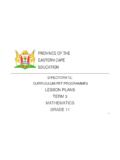Transcription of MTH 092 — College Algebra Essex County College …
1 MTH 092 College Algebra Essex County College division of Mathematics Sample Review Questions1 Created January 17, 2006. Math 092, Elementary Algebra , covers the mathematical content listed below. In order to place out of Math 092 or to prepare for the final examination in this course, one should be extremely comfortable with all of these items. NOTE: Calculators are not permitted in this course. The content listed below is covered in chapters 1 through 7 in the second half of Pre and Introductory Algebra , A Combined Text by Aufman, Barker and Lockwood (published by Houghton Mifflin Company), the current textbook used in Math 092. Adding, subtracting, multiplying, dividing, and exponentiating numbers (integers, frac- tions and decimals); reducing fractions to lowest terms (simplest form); converting between fractions, decimals, and percents. Evaluating and identifying variable terms, constant terms, and numerical coefficients of polynomials; determining what type of polynomial (monomial, binomial, trinomial) a given expression is.
2 Simplifying, adding, subtracting, multiplying, dividing, and exponentiating polynomials and rational expressions; rewriting zero and negative integer exponents. Simplifying arithmetic and algebraic expressions by following the order of operations Factoring by taking out the greatest common factor and by grouping; factoring trinomials, perfect square trinomials and differences of two squares. Solving algebraic equations involving integers, arithmetic and algebraic fractions, decimals, percents and/or parentheses; solving quadratic equations by factoring; solving ratios and proportions; solving literal equations for a specified variable in terms of other variables. Translating verbal expressions or sentences into variable expressions or algebraic equations. Solving application problems (including, but not limited to, markup and markdown, determine-the-number problems, uniform motion, perimeters and areas, and ratio/rate problems).
3 Graphing points and lines and identifying coordinates of given points on a rectangular (Cartesian) coordinate system. Determining the x-intercepts, y-intercepts and slopes of straight lines. Finding equations of lines by using either the slope-intercept or the point-slope formula. 1. This document was prepared by Ron Bannon using LATEX 2 and is a slight modification of Susan Gaulden's MTH 092 Content worksheet. 1. Review Problem Set At Essex County College you should be prepared to show all work clearly and in order, ending your work by boxing the answer. Furthermore, justify your answers algebraically whenever possible. These questions are for review only, and placement tests are not limited to these problems alone. Solutions and work are provided for each question. Please feel free to email with questions or comments pertaining to this 1. Simplify each of the following. (a) 3 + ( 12) + 6 ( 4). Solution: 3 + ( 12) + 6 ( 4) = 3 + ( 12) + 6 + 4.
4 = 15 + 10. = 5. 2. 3. (b) ( 4) 23. 4. Solution: 2. 3 9. ( 4) 23 = ( 4) 8. 4 16. 9. = 8. 4. = 18. (c) + 4 Solution: + 4 = ( ) + 4 + ( ). = ( ) + ( ) + 4. = ( ) + 4. = (d) ( ). Solution: ( ) = 2. These are sample problems and you should not limit your study to just these problems. 2. (e) Solution: = . 2718. = . 90. 151. = . 5. = (f) 12 + 16 4 2. Solution: 12 + 16 4 2 = 12 + 4 2. = 12 + 8. = 20. (g) 16 3 (8 3)2 5. Solution: 16 3 (8 3)2 5 = 16 3 (5)2 5. = 16 3 (25) 5. = 16 75 5. = 16 15. = 1. 2. Simplify each of the following and reduce to lowest terms (simplest form). 1 5 2. (a) +. 9 27 3. Solution: The LCD is 27. 1 5 2 3 5 + 18. + =. 9 27 3 27. 16. x =. 27. 3. 5 15. (b) . 12 32. Solution: 5 15 5 32. = . 12 32 12 15. 5 32. = . 15 12. 1 8. = . 3 3. 8. = . 9. 7. 3. Convert into an equivalent decimal and percent. 8. Solution: You may have to use long division . 7. = = 8. 4. Convert into an equivalent fraction and decimal. Solution: 1.
5 = . 100. =. 100. 52 13. = = =. 1000 250. 5. Evaluate (b 2a)2 + bc, given a = 2, b = 3, and c = 4. Solution: (b 2a)2 + bc = (3 2 2)2 + 3 ( 4). = (3 4)2 + 3 ( 4). = ( 1)2 + 3 ( 4). = 1 + 3 ( 4). = 1 + ( 12). = 11. 4. 6. Identify the constant term(s) and the variable term(s) of the expression 12a2 8ab+b+10. Then identify the numerical coefficient of each variable term. Solution: The constant term is 10 , the variable terms are 12a2 , 8ab and b . The numerical coefficient is 12a2 is 12 , the numerical coefficient is 8ab is 8 , and the numerical coefficient is b is 1 . 7. Simplify each of the following. 10a 3b 17a + 6b 5. (a) 10a 3b 17a + 6b 5. Solution: 10a 3b 17a + 6b 5 = 10a 17a 3b + 6b 5. = 7a + 3b 5. 2 x2 3x + 3 4x2 + 1.. (b). Solution: 2 x2 3x + 3 4x2 + 1 = 2x2 6x + 12x2 + 3.. = 14x2 6x + 3. (c) 5x 2 (x + 8). Solution: 5x 2 (x + 8) = 5x 2x 16. = 3x 16. 8. Simplify. 5m2 2m + 2 3 + 3m 2m2.. (a). Solution: 5m2 2m + 2 3 + 3m 2m2 = 5m2 2m + 2 + 3 3m + 2m2.
6 = 7m2 5m + 5. 2c2 d3 (3cd) 5c3 d5.. (b). Solution: 2c2 d3 (3cd) 5c3 d5 = ( 2) (3) ( 5) c2 c c3 d3 dd5.. = 30c6 d9. 5. 3. (c) 2n2. Solution: 3. 2n2 2n2 2n2. 2n2.. =. = ( 2) ( 2) ( 2) n2 n2 n2.. = 8n6. t2 3t + 4 (t 3).. (d). Solution: t2 3t + 4 (t 3) = (t 3) t2 3t + 4.. = t t2 3t + 4 3 t2 3t + 4.. = t3 3t2 + 4t 3t2 + 9t 12. = t3 6t2 + 13t 12. (e) (3x 1) (2x + 5). Solution: (3x 1) (2x + 5) = 6x2 + 15x 2x 5. = 6x2 + 13x 5. (f) (y 3)2. Solution: (y 3)2 = (y 3) (y 3). = y 2 3y 3y + 9. = y 2 6y + 9. 22m2 n 11mn 33mn2. (g). 11mn Solution: 22m2 n 11mn 33mn2 22m2 n 11mn 33mn2. = . 11mn 11mn 11mn 11mn = 2m 1 3n x2 5x + 8 (x 3).. (h). Solution: Using the long division algorithm, please review this process if you cannot get this answer. 2. x 2+ . x 3. 6. 2y 2 + 7. (i). y 3. Solution: Again, using the long division algorithm, but you might find it helpful to rewrite 2y 2 + 7 as 2y 2 + 0y + 7 first. 25. 2y + 6 + . y 3. 9. Simplify.
7 2x + 9 x 5. (a) . 9x 5x Solution: The LCD is 45x. 2x + 9 x 5 2x + 9 5 x 5 9. = . 9x 5x 9x 5 5x 9. 10x + 45 9x 45. = . 45x 45x 10x + 45 9x + 45. =. 45x x + 90. =. 45x 1 x 5x 2. (b) + . x + 1 x 6 x2 5x 6. Solution: Factor the denominators and the LCD is clearly (x + 1) (x 6). 1 x 5x 2 1 x 5x 2. + = + . x + 1 x 6 x2 5x 6 (x + 1) (x 6) (x + 1) (x 6). 1 (x 6) x (x + 1) 5x 2. = + . (x + 1) (x 6) (x 6) (x + 1) (x + 1) (x 6). 1 (x 6) + x (x + 1) (5x 2). =. (x + 1) (x 6). 2. x 6 + x + x 5x + 2. =. (x + 1) (x 6). 2. x 3x 4. =. (x + 1) (x 6). (x + 1) (x 4). =. (x + 1) (x 6). x 4. =. x 6. 7. x2 + 3x 10. (c). x2 + 2x 8. Solution: x2 + 3x 10 (x + 5) (x 2). =. x2 + 2x 8 (x + 4) (x 2). x+5. =. x+4. x2 7x 30 2x2 + 5x + 2. (d) . x2 6x 40 2x2 + 7x + 3. Solution: x2 7x 30 2x2 + 5x + 2 (x 10) (x + 3) (2x + 1) (x + 2). = . x2 6x 40 2x2 + 7x + 3 (x 10) (x + 4) (2x + 1) (x + 3). (x + 3) (x + 2). = . (x + 4) (x + 3). x+2. =. x+4. 3x2 y 9xy 3x2 x3.
8 (e) . a2 b ab2. Solution: 3x2 y 9xy 3x2 x3 3x2 y 9xy ab2. = . a2 b ab2 a2 b 3x2 x3. 3xy (3 x) ab2. = 2. 2. a b x (3 x). 3xy ab 2. = 2. a2 b x 3by = . ax 10. Simplify, final answer should not have negative expoments. 18x5 y (a). 12x3 y 4. Solution: 18x5 y 3x2. =. 12x3 y 4 2y 3. 8. 3. 3ab 2 2a 1 b . (b). Solution: 3. 3 3a 2b 3ab 2 2a 1 b . =. b2 a . 3a a 3. = 2. b 2b 3 . 3a a =. b2 8b3. 3a4. =. 8b5. 2a 3 b2. (c). 3ab 5. Solution: 2a 3 b2 2b2 b5. =. 3ab 5 3a3 a 2b7. =. 3a4. 2. 11. Determine whether 9x2 5 and y 2 + 3y are monomials, binomials, trinomials, or none y of these. 2. Solution: 9x2 5 is a binomial , whereas y 2 + 3y is none of these .3. y 12. Factor each of the following polynomials as completely as possible. (a) 2a2 b 5a2 b2 + 7ab2. Solution: 2a2 b 5a2 b2 + 7ab2 = ab (2a 5ab + 7b). (b) 2x2 5x 6xy + 15y Solution: 2x2 5x 6xy + 15y = x (2x 5) 3y (6x 5y). = (2x 5) (x 3y). 3. It's not a polynomial because there's a variable used as a divisor.
9 9. (c) x2 + 5x 36. Solution: x2 + 5x 36 = (x + 9) (x 4). (d) 9x2 13x 4. Solution: Not factorable over the integers. (e) 16 9m2. Solution: 16 9m2 = (4 3m) (4 + 3m). (f) 4x4 38x3 + 48x2. Solution: 4x4 38x3 + 48x2 = 2x2 2x2 19x + 24.. = 2x2 (2x 3) (x 8). 13. Solve each of the following equations. (a) 3 2x = 15 + 4x Solution: 3 2x = 15 + 4x 3 15 = 2x + 4x 12 = 6x 2 = x So the solution is x = 2 . 2 3. (b) x+ =. 3 4. Solution: Multiple both sides by the LCD. 2 3. x+ =. 3 4. 12x + 8 = 9. 12x = 1. 1. x =. 12. So the solution is x = 1/12 . 10. 3. (c) x = 12. 5. Solution: 3. x = 12. 5. 5. x = 12. 3. x = 20. So the solution is x = 20 . x (d) = Solution: x = x = x = So the solution is x = . 1 2 1. (e) x=. 2 3 4. Solution: 1 2 1. x =. 2 3 4. 6 8x = 3. 6 3 = 8x 3 = 8x 3. = x 8. So the solution is x = 3/8 . (f) 9x 3 (2x 1) = 15. Solution: 9x 3 (2x 1) = 15. 9x 6x + 3 = 15. 3x + 3 = 15. 3x = 15 3. 3x = 12. x = 4. So the solution is x = 4.
10 11. (g) x2 8x + 15 = 0. Solution: x2 8x + 15 = 0. (x 5) (x 3) = 0. So the solution is x = 5, or x = 3 . (h) x (x 11) = 12. Solution: x (x 11) = 12. x2 11x = 12. x2 11x 12 = 0. (x 12) (x + 1) = 0. So the solution is x = 12, or x = 1 . (i) (x + 3) (x + 4) = 72. Solution: (x + 3) (x + 4) = 72. x2 + 7x + 12 = 72. x2 + 7x 60 = 0. (x + 12) (x 5) = 0. So the solution is x = 12, or x = 5 . 5 3. (j) =. x+3 x 1. Solution: 5 3. =. x+3 x 1. 5 (x 1) = 3 (x + 3). 5x 5 = 3x + 9. 5x 3x = 5 + 9. 2x = 14. x = 7. So the solution is x = 7 . 12. 3 x (k) 2+ =. x 3 x 3. Solution: 3 x 2+ =. x 3 x 3. x 3. 2 = . x 3 x 3. x 3. 2 =. x 3. 2 (x 3) = x 3. 2x 6 = x 3. 2x x = 6 3. x = 3. This equation has no solution . This may not be obvious, but the original statement is a contradiction and can never be true. 14. Solve for the indicated variable. C S. (a) R= for S. t Solution: C S. R =. t Rt = C S. Rt C = S. C Rt = S. So the solution is S = C Rt.




